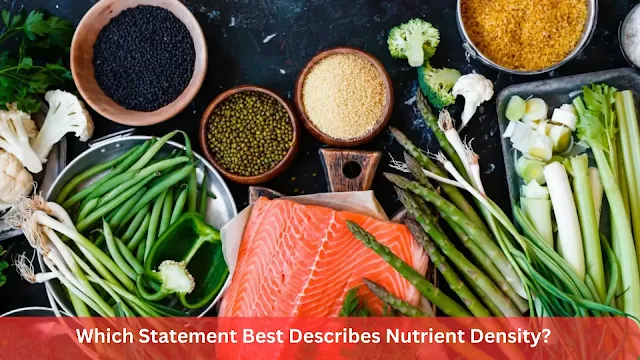Discover what nutrient density truly means and which statement best describes it. Uncover the nutrient density definition and gain insights into the concept. Learn how nutrient density impacts your food choices and why it matters for your health. Explore the key aspects of nutrient density and its significance in making informed dietary decisions.
Understanding Nutrient Density: A Key to a Healthier Lifestyle
Have you ever wondered what lies beneath the surface of your plate beyond the taste and appearance of the food you eat? Nutrient density is the secret ingredient that determines the true value of a diet, the unsung hero. In this comprehensive guide, we'll take a closer look at nutrient density, discover its meaning, explore its impact on your health, and give you practical tips to help you make better food choices. So let's go on a journey of discovery together to discover the words that best describe nutrient density.
What is nutrient density?
Simply put, nutrient density is a measure of the important nutrients a food provides relative to its caloric content. It's a key nutritional metric that allows you to gauge whether you're getting the benefit, or rather the nutrition, for your calorie intake. In short, it's about getting the most nutritional value from every bite of food. Imagine there are two plates in front of you. You have a vibrant, colorful salad packed with fresh vegetables, lean protein and a drizzle of olive oil. Another has fast food burgers, fries and soda. Which is more nutritious? Salad of course! It is packed with essential vitamins, minerals and antioxidants, while fast food is full of empty calories and has little nutritional value.
The Significance of Nutrient Density
Now that we understand what nutrient density is, let's examine why it is critical to our health. The best way to describe nutrient density is that it is the key to a healthier lifestyle. Here's why:
Optimal Health
Nutritious food is the cornerstone of good health. They provide essential nutrients such as vitamins, minerals, fiber and antioxidants that our bodies need to function optimally. These nutrients support everything from strong bones to a strong immune system.
Weight Management
If you're watching your weight, nutrient density should be your guiding principle. Nutritious foods can help you feel fuller for longer and reduce the risk of overeating. This can change your efforts to maintain or achieve a healthy weight.
Disease Prevention
Many chronic diseases, such as heart disease, diabetes and certain types of cancer, are linked to poor dietary choices. A diet rich in nutritious foods can help reduce the risk of these diseases.
Energy and Vitality
Nutritious foods provide a stable, renewable source of energy. They can help you stay alert, focused, and energized throughout the day without the dreaded energy crash that often accompanies empty-calorie foods.
Identifying Nutrient-Dense Foods
So how do you identify nutrient-dense foods in the real world, where labels and marketing claims can be misleading?
The following advice will assist you in making an informed decision:
Colorful Fruits and Vegetables
Nature often provides the most nutritious options in the form of colorful fruits and vegetables. These foods are a good source of antioxidants, vitamins, and minerals. Try to fill half the plate with them.
Lean Proteins
Lean protein sources such as chicken, turkey, fish and beans are good choices. They provide the amino acids needed for muscle growth and repair without excess saturated fat.
Whole Grains
Choose whole grains over refined grains. Whole grains like quinoa, brown rice, and oats contain more fiber and nutrients, making them a healthier choice.
Healthy Fats
Choose sources of healthy fats such as avocados, nuts and olive oil. These fats are heart-healthy and provide essential fatty acids.
Minimize Processed Foods
Processed foods are often low in nutrient density and high in empty calories. Limit sugary snacks, fast food and highly processed foods.
Finally
In summary, nutrient density is the cornerstone of a healthier lifestyle. This quote best describes the essence of careful food choices. By prioritizing nutrient-dense foods, you can improve your overall health, effectively manage your weight, and reduce your risk of chronic disease. Remember that every bite you eat is an opportunity to feed your body and grow. So choose the foods that provide the most nutritional value for your health and let them do their work.

0 comments:
Post a Comment